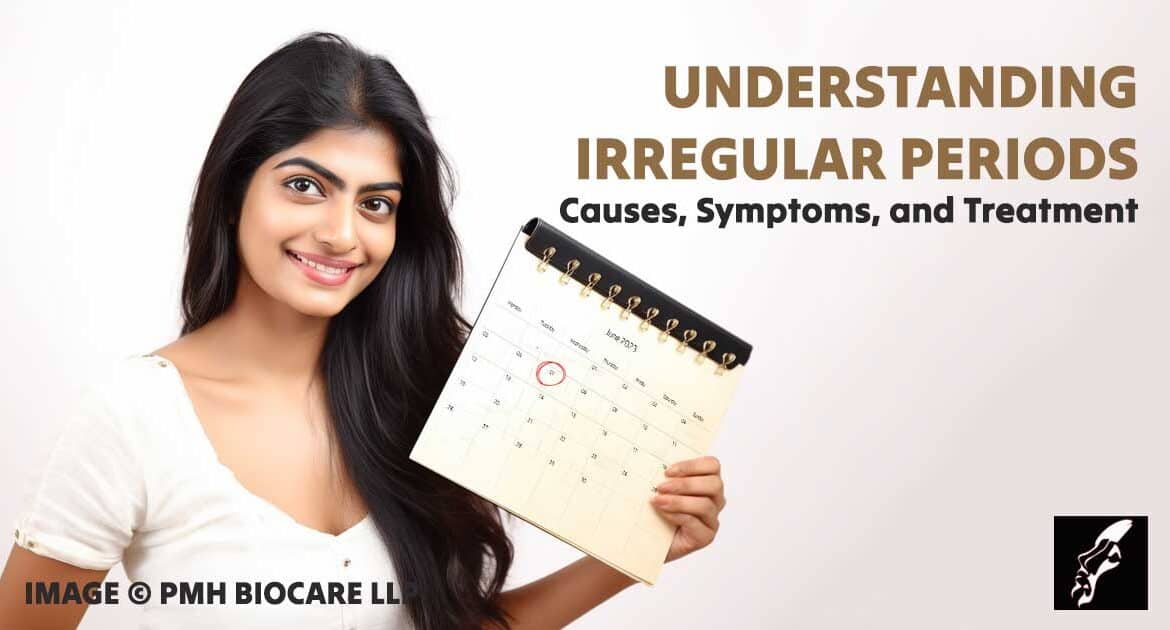Understanding Irregular Periods: Causes, Symptoms, and Treatment

Irregular periods can be a cause of worry and discomfort for many women. In this article, we will delve into the topic of irregular periods, exploring their causes, symptoms, and available treatments. By gaining a better understanding of this common issue, you can take charge of your reproductive health and work towards achieving regular and predictable menstrual cycles.
What Are Irregular Periods?
Irregular periods refer to menstrual cycles that deviate from the typical pattern of occurring every 21 to 35 days. Instead, the length between periods may vary, and the flow may be heavier or lighter than usual. It’s important to note that occasional irregularities are common, but persistent irregular periods may indicate an underlying issue that requires attention.
What are the causes of Irregular Periods?
Several factors can contribute to irregular periods. Let’s explore the primary causes:
- Hormonal Imbalances : Hormonal imbalances, such as those associated with polycystic ovary syndrome (PCOS) or thyroid disorders, can disrupt the normal menstrual cycle.
- Lifestyle Factors : Unhealthy lifestyle habits, including poor nutrition, extreme weight loss or gain, smoking, and substance abuse, can also lead to irregular periods.
- Underlying Health Conditions : Certain conditions, like PCOS, uterine fibroids, endometriosis, pelvic inflammatory disease (PID), and thyroid disorders, can disrupt the menstrual cycle.
- Medications and Medical Treatments : Some medications and medical treatments, such as certain contraceptives, fertility treatments, anticoagulants, and antidepressants, can interfere with hormonal balance and trigger irregular periods.
What Conditions Cause Irregular Menstruation?
Irregular periods can be linked to various health conditions. Understanding these conditions helps identify the root cause of irregular periods and find suitable treatment. Let’s explore some common conditions associated with irregular menstruation:
- Polycystic Ovary Syndrome (PCOS) : PCOS is a hormonal disorder affecting women of reproductive age. It involves cysts on the ovaries, hormonal imbalances, and irregular or absent periods.
- Thyroid Disorders : Both underactive (hypothyroidism) and overactive (hyperthyroidism) thyroid can disrupt hormone balance, leading to irregular periods.
- Premature Ovarian Insufficiency (POI) : POI occurs when the ovaries stop functioning before age 40. It causes irregular or absent periods, hot flashes, and infertility.
- Uterine Fibroids : Non-cancerous growths in the uterus called fibroids can cause irregular periods, heavy bleeding, and pelvic pain, depending on their size and location.
- Endometriosis : Endometriosis happens when the tissue lining the uterus grows outside it. It results in irregular periods, severe pelvic pain, and fertility issues.
- Pelvic Inflammatory Disease (PID) : PID is an infection of the female reproductive organs, often caused by sexually transmitted infections (STIs). It can lead to irregular bleeding, pelvic pain, and discomfort.
- Ovarian Cysts : Fluid-filled sacs on or within the ovaries known as ovarian cysts can disrupt the menstrual cycle and cause irregular periods if they are large or persistent.
- Asherman’s Syndrome : Scar tissue formation inside the uterus, usually due to prior uterine surgeries or infections, characterizes Asherman’s syndrome. It can result in menstrual irregularities and infertility.
- Hormonal Imbalances : Imbalances in estrogen, progesterone, and luteinizing hormone (LH) can cause irregular periods. Factors like stress, excessive exercise, or certain medications can contribute to hormonal imbalances.
Remember, this is not an exhaustive list, and there may be other underlying conditions related to irregular menstruation. If you suspect an underlying condition is causing your irregular periods, consult with a healthcare provider for a proper diagnosis and personalized treatment plan.
What are the symptoms of Irregular Periods?
Recognizing the symptoms associated with irregular periods can help you identify any irregularities in your menstrual cycle. Here are some common signs to watch out for:
- Changes in Menstrual Flow : Irregular periods may result in unusually heavy or light menstrual bleeding.
- Irregular Cycle Length : The duration between periods may become shorter or longer than usual, making it difficult to predict when the next period will occur.
- Missed or Skipped Periods : Irregular periods often involve missed or skipped periods, with several months passing without menstruation.
- Menstrual Pain : Irregular periods can be accompanied by heightened menstrual pain, including severe cramping, backaches, and pelvic discomfort.
Why Is My Period Late?
A late period can be distressing, especially if you are trying to conceive or maintain regularity in your cycle. While pregnancy is the most common reason for a missed period, other factors can contribute to a delayed menstrual cycle:
- Stress and Anxiety : Emotional stress, anxiety, and significant life changes can disrupt hormonal balance, causing a delay in your period.
- Hormonal Imbalances : Fluctuations in hormone levels, often associated with conditions like PCOS or thyroid disorders, can lead to delayed periods.
- Weight Loss or Weight Gain : Rapid weight loss or gain can impact hormonal balance and delay the menstrual cycle.
- Medical Conditions : Conditions such as polycystic ovary syndrome (PCOS) and ovarian cysts can contribute to delayed periods.
What is the Impact of Weight Loss or Weight Gain on Period Regularity?
Weight fluctuations, both loss and gain, can indeed affect the regularity of your menstrual cycle. Significant weight changes disrupt the delicate hormonal balance required for a regular period. Rapid weight loss or extreme dieting can lead to irregular or absent periods. Conversely, obesity or sudden weight gain can also affect your menstrual cycle.
What are the Effect of Birth Control Methods on Menstrual Cycle Regularity?
Certain birth control methods can influence the regularity of your menstrual cycles. Hormonal contraceptives, such as birth control pills, patches, and hormonal intrauterine devices (IUDs), work by regulating hormone levels and can help establish a more predictable menstrual cycle. On the other hand, non-hormonal birth control methods, like copper IUDs, generally do not impact the regularity of your periods.
What are the Natural Remedies for Irregular Menstrual Cycles?
If you prefer natural remedies, several options can potentially help regulate your menstrual cycles. Keep in mind that these remedies may not work for everyone, and it’s essential to consult with a healthcare professional before incorporating them into your routine. Here are some natural remedies to consider:
- Healthy Lifestyle : Maintain a balanced diet, exercise regularly, manage stress through relaxation techniques, and prioritize sufficient sleep.
- Herbal Supplements : Certain herbs, such as chasteberry, evening primrose oil, and ginger, have been traditionally used to regulate menstrual cycles. However, their effectiveness may vary, so it’s essential to consult with a healthcare provider before using them.
- Acupuncture : Acupuncture, an ancient Chinese practice, has shown promise in regulating menstrual cycles by promoting hormonal balance and reducing stress.
How to Track Your Menstrual Cycle for Identifying Irregularities?
Tracking your menstrual cycle can help identify irregularities and provide valuable information to healthcare providers. Here are some methods for effective tracking:
- Calendar Method : Use a calendar to mark the first day of each period, noting the duration and any significant changes in flow or symptoms.
- Mobile Apps : Utilize smartphone apps specifically designed for tracking menstrual cycles. These apps allow you to record symptoms, predict future periods, and provide personalized insights.
- Menstrual Diary : Keep a dedicated diary to log your menstrual cycles, including dates, flow intensity, symptoms, and any irregularities you observe.
- Menstrual Tracking Devices : Consider using wearable trackers or smartwatches that can monitor your menstrual cycle and provide valuable data.
What are the Potential Complications of Irregular Periods?
If left unaddressed, irregular periods can lead to various complications and impact your overall well-being. It’s crucial to be aware of these potential complications:
- Fertility Challenges : Irregular periods can make it difficult to conceive since ovulation may be unpredictable or infrequent.
- Anemia : Excessive or prolonged menstrual bleeding associated with irregular periods can result in iron deficiency anemia, causing fatigue, weakness, and other symptoms.
- Emotional Distress : Dealing with unpredictable periods can cause emotional distress, including anxiety, frustration, and a sense of loss of control.
- Bone Health : Hormonal imbalances associated with irregular periods can affect bone density and increase the risk of osteoporosis in the long term.
When to Consult a Healthcare Provider?
- Persistent irregularities in menstrual pattern, sudden changes, or prolonged and heavy bleeding.
- Menstrual cycles are accompanied by severe pain, discomfort, or symptoms that significantly affect daily life.
- Difficulties conceiving due to irregular periods.
- Worsening of irregular periods or new symptoms in individuals with underlying health conditions such as PCOS or thyroid disorders.
- Fever and chills after using tampons, which may indicate the possibility of toxic shock syndrome (TSS).
- Menstrual cycles occur less than 21 days or more than 35 days apart.
- Unexpected bleeding or spotting between periods.
- Severe menstrual pain or intense abdominal cramping during periods.
- Unusually heavy bleeding or passing large blood clots.
- Foul-smelling vaginal discharge accompanying menstrual bleeding.
- Prolonged periods lasting longer than seven days.
- Vaginal bleeding or spotting after menopause.
- Significant irregularity after previously having regular menstrual cycles.
- Severe nausea or vomiting during the menstrual cycle.
- Symptoms of toxic shock syndrome (TSS) such as fever, vomiting, diarrhea, fainting, or dizziness.
It is important to remember that every woman’s menstrual cycle is unique. If you have concerns or experience any abnormal symptoms during your menstrual cycles, it is crucial to listen to your body and seek medical guidance. A healthcare provider can offer personalized advice, conduct necessary evaluations, and recommend appropriate treatment options to ensure your reproductive health and overall well-being.
What are the Irregular Menstruation Treatments?
The appropriate irregular menstruation treatment depends on the underlying cause and individual circumstances. Treatment options may include:
- Hormonal Birth Control : Hormonal birth control methods, such as pills, patches, or hormonal IUDs, can help regulate your menstrual cycles by providing a consistent hormonal balance.
- Hormone Therapy : In certain cases, hormone therapy involving the use of estrogen or progesterone medications may be prescribed to restore hormonal balance and regulate menstrual cycles.
- Surgical Interventions : For underlying conditions like uterine fibroids or endometriosis, surgical interventions may be necessary to address the root cause of irregular periods.
- Lifestyle Modifications : Implement healthy lifestyle changes, including a balanced diet, regular exercise, stress management, and adequate sleep, to support overall menstrual health.
How Can Hermones (Natural Supplement) Help Regulate Menstrual Cycles and Hormonal Imbalances?
Hermones offers a natural solution for women experiencing irregular periods and hormonal imbalances. By addressing key hormones involved in menstrual regulation and conditions like PCOD/PCOS, Hermones aims to restore balance and promote healthier menstrual cycles. With Hermones, you can take control of your menstrual health and achieve more predictable and comfortable periods.
If you’re ready to take control of your menstrual health and experience the benefits of Hermones, you can conveniently purchase it by simply clicking on the “Order Now” button in the top menu or from online platforms such as Amazon. Don’t let hormonal imbalances disrupt your life any longer. Try Hermones today and embark on your journey to balanced hormones and regular periods.
Conclusion:
Understanding the causes, symptoms, and treatment options for irregular periods empowers you to take control of your reproductive health. By tracking your menstrual cycle, adopting a healthy lifestyle, and seeking medical guidance when necessary, you can navigate the challenges of irregular periods and work towards achieving regular and predictable menstrual cycles.
Remember, your menstrual health is a priority, and with the right support and a comprehensive approach, you can achieve more predictable and comfortable periods. Take the first step towards hormonal balance and order your supply of Hermones today.





